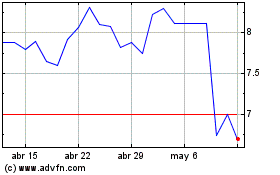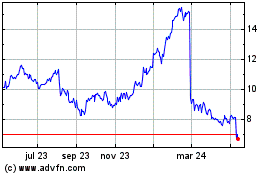– Newly published data highlights additional
efficacy endpoints from trial –
– Linaclotide is the first and only
FDA-approved prescription therapy for children and adolescents aged
6-17 years with functional constipation –
Ironwood Pharmaceuticals, Inc. (Nasdaq: IRWD), a
GI-focused healthcare company, today announced that new data from
the Phase III study that evaluated linaclotide in children and
adolescents aged 6-17 years with functional constipation were
published in The Lancet Gastroenterology & Hepatology. The data
highlights additional efficacy endpoints from the company’s pivotal
Phase III trial, which formed the basis of the June 2023 U.S. Food
and Drug Administration (FDA) approval of linaclotide for the
treatment of functional constipation in this population.
Functional constipation in children is defined as a condition
with hard, infrequent bowel movements that are often difficult or
painful to pass1. The condition affects an estimated 6 million
children aged 6-17 years in the U.S.2
“Functional constipation is among the most common complaints
pediatricians and pediatric GIs see in our patients,” said Miguel
Saps, Chief of Division of Pediatric Gastroenterology, Hepatology,
and Nutrition and the George E. Batchelor Endowed Chair in
Pediatrics, University of Miami, University of Miami Health System.
“The insights provided by the additional efficacy endpoints in this
Phase III clinical trial are an important supplement to clinicians’
knowledge about the available treatment options for this
population.”
In this peer-reviewed pivotal study, a total of 328 patients
received the study treatment, randomized (1:1) to either
linaclotide 72 mcg or placebo. Linaclotide demonstrated a
statistically significant and clinically meaningful improvement
compared to placebo in 12-week spontaneous bowel movement(s) (SBM)
frequency rate (SBMs/week), the primary endpoint. A statistically
significant proportion of linaclotide-treated patients achieved a
greater than two-fold least squares mean change from baseline in
SBMs/week (2.220) compared to placebo (1.050) (p<0.0001). Stool
consistency, as assessed by Bristol Stool Form Scale (BSFS) scores,
which was the secondary endpoint, also showed an improvement at
week 12 with linaclotide compared to placebo. The BSFS is a 7-point
scale ranging from 1 (separate, hard, difficult-to-pass lumps) to 7
(liquid stools). The change from baseline of 12-week complete SBM
frequency rate demonstrated a greater increase in the linaclotide
group compared with the placebo group (LSM CFB difference=0.96
complete SBMs/week; 95% CI 0.51–1.40; p<0.0001). Additionally,
the percentage of patients with at least one SBM within 24 or 48
hours of first dose of study drug was higher in the linaclotide
group compared with the placebo group (24 hours: 30.5% vs 20.7%,
p=0.043; 48 hours: 56.7% vs 38.4%, p=0.0009).
Overall, linaclotide was well-tolerated in this study. Both
study arms had similar proportions of patients with AEs: TEAEs
(LIN, 17%; PBO, 21%), serious AEs (1.2% for both), and TEAEs
leading to study treatment discontinuation (LIN, 1.2%, PBO, 1.8%).
The most reported treatment-emergent adverse event (TEAE) by
patients treated with linaclotide was diarrhea (seven [4%] of 164)
and by patients treated with placebo was COVID-19 (five [3%] of
164). The most frequent treatment-related TEAE was diarrhea
(linaclotide: six [4%] patients; placebo: two [1%] patients). The
safety profile of linaclotide in pediatric patients is consistent
with prior linaclotide studies in adults.
The manuscript published in The Lancet Gastroenterology &
Hepatology further described that:
- A greater percentage of patients in the linaclotide treatment
group were weekly SBM responders (patients who had an increase ≥2
in the SBM weekly rate from baseline for that week) compared with
the placebo group at weeks 1, 3, 4, 6, 7, 11, and 12 (p <
0·05).
- Of the patients receiving rescue medicines, significantly fewer
patients reported an increase in rescue medication use or use of
any other laxative, suppository, or enema in the linaclotide group
(25 of 164; 15·2%) compared with the placebo group (43 of 164;
26·2%) [p=0·015].
Linaclotide (marketed as LINZESS®) 72mcg is available in the
U.S. for the treatment of functional constipation for pediatric
patients aged 6-17 years old.
“We are committed to providing ongoing data about our products
to medical professionals and the scientific community,” said
Michael Shetzline, M.D., Ph.D., chief medical officer, senior vice
president, and head of research and drug development at Ironwood
Pharmaceuticals. “The publication of these results in The Lancet
Gastroenterology & Hepatology adds to the body of knowledge
about linaclotide and helps close the unmet needs gap in pediatric
patients ages 6- 17 with FC.”
About Linaclotide
LINZESS® is the #1 prescribed brand in the U.S. for the
treatment of adult patients with irritable bowel syndrome with
constipation (“IBS-C”) or chronic idiopathic constipation (“CIC”),
based on IQVIA data.
LINZESS is a once-daily capsule that helps relieve the abdominal
pain, constipation, and overall abdominal symptoms of bloating,
discomfort and pain associated with IBS-C, as well as the
constipation, infrequent stools, hard stools, straining, and
incomplete evacuation associated with CIC. LINZESS relieves
constipation in children and adolescents aged 6 to 17 years with
functional constipation. The recommended dose in adults is 290 mcg
for IBS-C patients and 145 mcg for CIC patients, with a 72 mcg dose
approved for use in CIC depending on individual patient
presentation or tolerability. In children with functional
constipation aged 6 to 17 years, the recommended dose is 72
mcg.
LINZESS is not a laxative; it is the first medicine approved by
the FDA in a class called GC-C agonists. LINZESS contains a peptide
called linaclotide that activates the GC-C receptor in the
intestine. Activation of GC-C is thought to result in increased
intestinal fluid secretion and accelerated transit and a decrease
in the activity of pain-sensing nerves in the intestine. The
clinical relevance of the effect on pain fibers, which is based on
nonclinical studies, has not been established.
In the United States, Ironwood and AbbVie co-develop and
co-commercialize LINZESS for the treatment of adults with IBS-C or
CIC. In Europe, AbbVie markets linaclotide under the brand name
CONSTELLA® for the treatment of adults with moderate to severe
IBS-C. In Japan, Ironwood's partner, Astellas, markets linaclotide
under the brand name LINZESS for the treatment of adults with IBS-C
or CIC. Ironwood also has partnered with AstraZeneca for
development and commercialization of LINZESS in China, and with
AbbVie for development and commercialization of linaclotide in all
other territories worldwide.
LINZESS Important Safety Information
INDICATIONS AND USAGE
LINZESS (linaclotide) is indicated in adults for the treatment
of both irritable bowel syndrome with constipation (IBS-C) and
chronic idiopathic constipation (CIC) and functional constipation
(FC) in children and adolescents 6 to 17 years of age. It is not
known if LINZESS is safe and effective in children with FC less
than 6 years of age or in children with IBS-C less than 18 years of
age.
IMPORTANT SAFETY INFORMATION
WARNING: RISK OF SERIOUS DEHYDRATION IN
PEDIATRIC PATIENTS LESS THAN 2 YEARS OF AGE
LINZESS is contraindicated in patients
less than 2 years of age. In nonclinical studies in neonatal mice,
administration of a single, clinically relevant adult oral dose of
linaclotide caused deaths due to dehydration.
Contraindications
- LINZESS is contraindicated in patients less than 2 years of age
due to the risk of serious dehydration.
- LINZESS is contraindicated in patients with known or suspected
mechanical gastrointestinal obstruction.
Warnings and Precautions
- LINZESS is contraindicated in patients less than 2 years of
age. In neonatal mice, linaclotide increased fluid secretion as a
consequence of age-dependent elevated guanylate cyclase (GC-C)
agonism, which was associated with increased mortality within the
first 24 hours due to dehydration. There was no age dependent trend
in GC-C intestinal expression in a clinical study of children 2 to
less than 18 years of age; however, there are insufficient data
available on GC-C intestinal expression in children less than 2
years of age to assess the risk of developing diarrhea and its
potentially serious consequences in these patients.
Diarrhea
- In adults, diarrhea was the most common adverse reaction in
LINZESS-treated patients in the pooled IBS-C and CIC double-blind
placebo-controlled trials. The incidence of diarrhea was similar in
the IBS-C and CIC populations. Severe diarrhea was reported in 2%
of 145 mcg and 290 mcg LINZESS-treated patients and in <1% of 72
mcg LINZESS-treated CIC patients.
- In children and adolescents 6 to 17 years of age, diarrhea was
the most common adverse reaction in 72 mcg LINZESS-treated patients
in the FC double-blind placebo-controlled trial. Severe diarrhea
was reported in <1% of 72 mcg LINZESS treated patients. If
severe diarrhea occurs, dosing should be suspended and the patient
rehydrated.
Common Adverse Reactions (incidence ≥2% and greater than
placebo)
- In IBS-C or CIC adult patients: diarrhea, abdominal pain,
flatulence, and abdominal distension.
- In FC pediatric patients: diarrhea.
Please see full Prescribing Information including Boxed Warning:
http://www.allergan.com/assets/pdf/linzess_pi
LINZESS® and CONSTELLA® are registered trademarks of Ironwood
Pharmaceuticals, Inc. Any other trademarks referred to in this
press release are the property of their respective owners. All
rights reserved.
About Ironwood Pharmaceuticals
Ironwood Pharmaceuticals (Nasdaq: IRWD), an S&P SmallCap
600® company, is a leading gastrointestinal (GI) healthcare company
on a mission to advance the treatment of GI diseases and redefine
the standard of care for GI patients. We are pioneers in the
development of LINZESS® (linaclotide), the U.S. branded
prescription market leader for adults with irritable bowel syndrome
with constipation (IBS-C) or chronic idiopathic constipation (CIC).
In June 2023, the U.S. Food and Drug Administration also approved
LINZESS for the treatment of functional constipation in pediatric
patients ages 6-17 years-old. Ironwood is also advancing
apraglutide, a next-generation, long-acting synthetic GLP-2 analog
being developed for rare gastrointestinal diseases, including short
bowel syndrome with intestinal failure (SBS-IF) as well as several
earlier stage assets. Building upon our history of GI innovation,
we keep patients at the heart of our R&D and commercialization
efforts to reduce the burden of GI diseases and address significant
unmet needs.
Founded in 1998, Ironwood Pharmaceuticals is headquartered in
Boston, Massachusetts, and has additional operations in Basel,
Switzerland.
We routinely post information that may be important to investors
on our website at www.ironwoodpharma.com. In addition, follow us on
X and on LinkedIn.
__________________________ 1 Di Lorenzo C, Hyams JS, Saps M, et
al. Chapter 16: Childhood Functional Gastrointestinal Disorders:
Child/Adolescent. In: Drossman DA, Chang L, Chey WD, et al. Rome
IV: Functional Gastrointestinal Disorders: Disorders of Gut-Brain
Interaction. Raleigh, NC: Rome Foundation; 2016. 2 U.S. Census,
2017 National Population Projection Tables; Robin, Samantha G. et
al, Prevalence of Pediatric Functional Gastrointestinal Disorders
Utilizing the Rome IV Criteria, The Journal of Pediatrics, December
2017; Koppen, I. J. N. et al., Prevalence of Functional Defecation
Disorders in Children: A Systemic Review and Meta-Analysis. J
Pediatr. 2018.
View source
version on businesswire.com: https://www.businesswire.com/news/home/20240108343579/en/
Media: Beth Calitri, 978-417-2031
bcalitri@ironwoodpharma.com Investors: Greg Martini,
617-374-5230 gmartini@ironwoodpharma.com Matt Roache, 617-621-8395
mroache@ironwoodpharma.com
Ironwood Pharmaceuticals (NASDAQ:IRWD)
Gráfica de Acción Histórica
De Mar 2024 a Abr 2024

Ironwood Pharmaceuticals (NASDAQ:IRWD)
Gráfica de Acción Histórica
De Abr 2023 a Abr 2024
